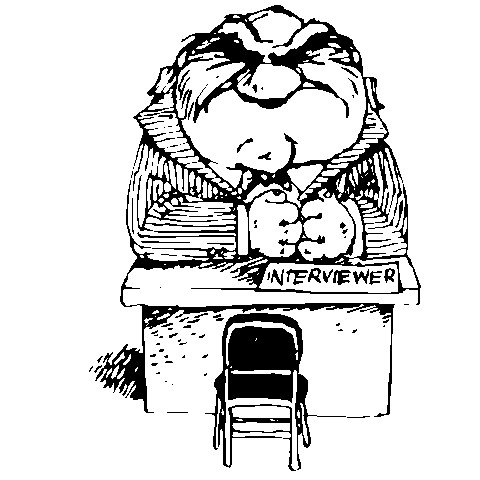
A friend of mine recently left his job at a major academic institution where he worked his way up from the ground floor into a middle management position before leaving for the upper ranks at a competitor’s on the west coast. As a courtesy to the organization in which he had given so much, and so much given to him, he approached his superior's administrative assistant and asked if there was a formal “exit interview” that he was to partake in prior to his final day at the end of the week.
“Usually only people that want to complain ask for exit interviews,” the administrative assistant explained, “did you still want to speak with him?”
“ummm, well, no, not anymore,” my friend replied.
Wouldn’t an exit interview be the perfect opportunity to gain feedback into your organization’s weaknesses, customer service, and operating procedures?
Sure the employee may be salty that they are leaving, but what chance for feedback do you have otherwise once they’ve walked out the door?
You should search out that employee and simply ask, “what can we do better?” This is the only time they won’t be afraid to tell you exactly how it is. You can sift through the salt and substance after, but once they’re gone, they’re gone, and hence so is the opportunity for your organization to improve.
Art Horne is the Coordinator of Care and Strength & Conditioning Coach for the Men’s Basketball Team at Northeastern University, Boston MA. He can be reached at a.horne@neu.edu.
Topics:
Art Horne,
basketball resources,
Ownership,
Good to Great,
discipline,
customer service,
everything basketball,
development,
managing

At the end of this next semester how will you introduce yourself?
Will your boss know you simply by the name on your driver’s license or as the leader of a new project? The staff nutrition expert? The master coach? The staff liaison to the health center, athletic training room or weight room?
If you want your colleagues and prospective employers to know your name you must be willing to bring your work to the world. You must be willing to rename yourself as "the person who gets things done." If you are not willing, well, that work will simply get outsourced to someone else who is.
Either or, the work will eventually get done.
You might as well have your name on it.
Art Horne is the Coordinator of Care and Strength & Conditioning Coach for the Men’s Basketball Team at Northeastern University, Boston MA. He can be reached at a.horne@neu.edu.
Topics:
Art Horne,
Strength Training,
motivation,
Ownership,
Good to Great,
discipline,
athletic trainer,
managing

In a recent post by Seth Godin he challenges one’s normal approach to problem solving which is usually the “wait to be inspired then act” method and asks us to instead actively seek out inspiration.
Seth states, “Simple example: start a blog and post once a day on how your favorite company can improve its products or its service. Do it every day for a month, one new, actionable idea each and every day. Within a few weeks, you'll notice the change in the way you find, process and ship.”
My challenge to you is to take Seth’s example of blogging, but instead of blogging about your favorite company, write down one new actionable idea each and every day this coming month that will improve your department’s service to your student-athletes. It may be as simple as greeting each athlete or patient with a high five as they enter your office or as complex as a new pre-participation exam that actually screens them for risk factors that matter. Or how about an idea that will provide your staff with more opportunities to ship?
Once you’ve committed to writing down these ideas you’ll not only discover there are a number of easy ways to improve your services, but you’ll actually find yourself leading others to the trough of change.
Warning: you can lead a co-worker to water, but you can’t make them drink. But gosh darn it, seeing you drink first makes it a whole lot easier for others to drink the cool-aid.
Art Horne is the Coordinator of Care and Strength & Conditioning Coach for the Men’s Basketball Team at Northeastern University, Boston MA. He can be reached at a.horne@neu.edu.
Topics:
athletic training,
Strength & Conditioning,
motivation,
Ownership,
Good to Great,
discipline,
customer service,
evidence based medicine,
development,
Leadership,
managing

On line resources define Evidence Based Medicine as the following:
ev•i•dence-based med•i•cine
noun
Definition:
treatment based on reliable evidence: the use of clinical methods and decision-making that have been thoroughly tested by properly controlled, peer-reviewed medical research.
Now that we got that out of the way we can move forward with your definition?
The same?
You sure?
No other phrase has infiltrated both sports medicine and strength and conditioning more in the past decade, and for good reason. It guides clinical practice and allows us to allocate resources, time, and personnel towards obtaining best practice. The problem is not with evidence based medicine but with individuals providing “their own definition” in defense of the work they are conducting.
So the next time your co-worker starts ultra-sounding an entire thigh simply ask them what their definition of evidence based medicine is. Hint: we are not allowed to each have our own definition.
Art Horne is the Coordinator of Care and Strength & Conditioning Coach for the Men’s Basketball Team at Northeastern University, Boston MA. He can be reached at a.horne@neu.edu.
Topics:
basketball conference,
basketball training programs,
athletic training conference,
athletic training,
Strength & Conditioning,
Health,
Good to Great,
discipline,
evidence based medicine,
development,
Leadership,
managing

A business friend of mine is always talking about gaps in the market and turning a profit. Always looking to fill only those gaps that have a market and thus place only resources where they are best utilized. In discussing our department and without knowing anything about Sports Performance, the first question he asked me was this,
“Is there a gap in the market? And is there a market in the gap?”
A classic example of a gap in the market was the introduction of the Segway. At the time, and still to this day, there was no machine that enabled a person to stand upright and zip around at a running speed with little or no effort. A clear example of a gap in the market.
The problem that the makers of the Segway ran into was that they never followed up the first question with the second and asked themselves, “Is there a market in the gap?”
Besides a few mall rent-a-cops, the Segway basically was a flop – no market in the gap despite the massive gap in the market.
If you follow the NBA, you’ve no doubt heard the story of Kevin Durant’s failed bench press attempt at the NBA combine his rookie year. Kevin Durant can’t bench 185 lbs; some would say a clear a gap in his physique (market). What many failed to see though, was that there was absolutely no need to fill this gap in Kevin’s physique. Developing Kevin’s physique so that he could bench press 225 lbs, although fulfilling your ego, will not make him play any better… and hence no market in that gap. When examining your athletes both in rehab and performance the question we need to ask when addressing these programs is simple.
Is there a market in their gap? And if not, we need to start putting our resources into gaps that are marketable.
Art Horne is the Coordinator of Care and Strength & Conditioning Coach for the Men’s Basketball Team at Northeastern University, Boston MA. He can be reached at a.horne@neu.edu.
Topics:
basketball resources,
athletic training,
Strength & Conditioning,
Ownership,
Kevin Durant,
discipline,
development,
Leadership,
managing
Everyone’s entitled to their own opinion but not their own facts.
When meetings boil down to people’s opinions, I usually have to leave. I know that we are each entitled to our own opinion. I get that.
But don’t confuse your opinion with facts.
“Well, I feel this would be the best solution…”
Did you look at the distributor? Is there a cheaper way to get the same product? What about the warranty? How does it fit into our business model or fit our core principles? Is there evidence based literature that supports its use and price tag? Will it serve a large group or can it only be used by one individual at a time?
Facts take time to investigate. They take energy and a “superdisciplined” approach. Opinions are like talk at the barbershop.
I’ll take an order of more facts please.
Art Horne is the Coordinator of Care and Strength & Conditioning Coach for the Men’s Basketball Team at Northeastern University, Boston MA. He can be reached at a.horne@neu.edu.
Topics:
basketball resources,
athletic training conference,
athletic training,
Strength & Conditioning,
Ownership,
Good to Great,
discipline,
customer service,
development,
Leadership,
managing
Sometimes it feels like we have so much to do, so many little fires to put out, so many tasks to accomplish in so little time that we forget we are running around with scissors. Although this may not be literally speaking, the fact is that running with scissors, at least as my mom always told me, was dangerous.
Instead of running around with scissors in your hand, pass them off to someone that should actually be doing the trimming. You see, when you’re doing the job that other people were suppose to do, you’re wasting your time as well as theirs. When you do other people’s jobs you are actually making your organization worse.
Your job as a leader is to ask tough questions and challenge the scope of your job and the jobs of those around you.
Don’t confuse activities with accomplishments.
Now put down the scissors.
Art Horne is the Coordinator of Care and Strength & Conditioning Coach for the Men’s Basketball Team at Northeastern University, Boston MA. He can be reached at a.horne@neu.edu.
Topics:
Strength Training,
basketball resources,
athletic training conference,
Ownership,
Good to Great,
discipline,
athletic trainer,
customer service,
development,
managing
I had a manager from another company give me a call recently for a reference on a employee that worked for me several years ago. He explained a little about the position and then I in turn told him a little about the employee's responsibilities here and how this particular person fit in with the group. When I was done, he asked me how this employee stood out from the rest. Great question. My answer was immediate and without hesitation; they were one of my top students because they took ownership of their position.
What is ownership exactly? It's the difference between someone who does the minimum of what is expected of them and someone that takes a legitimate interest in improving their workplace. Let's take the Ownership Quiz . . .
* During staff meetings, are you the person who volunteers for new tasks/projects or are you the person who lowers their eyes hoping someone else raises their hand?
* Do you take pride in the work you do on a day to day basis or do you simply do what is asked of you and be glad it's done?
* Do you take the initiative, bringing ideas for positive change to your office or are you the person that simply complains about how things could be better?
* If there is an issue outside of business hours, do your coworkers know it's alright to contact you or are they under the impression that would be a cardinal sin?
* Do you subscribe more to the idea of getting your job done rather than the phrase "business hours" or are you punching a clock at 9a and 5p every single day?
What if your well-being was tied directly into the performance of your whole office? Well, I've got news for you. It is. Ownership is about treating your position as if you owned your own business. It is about being a catalyst for positive growth in your environment regardless of whether you are the VP or an entry-level employee. When you own your position, you are telling your supervisors, your co-workers, and the employees under you that you care. You are providing a positive example for all and working towards bettering your environment regardless of the situation. The highest compliment that I can give to any of my employees is that they took ownership of their position. These are the ones that stood and continue to stand out from the crowd, even years later.
Are you taking ownership of your workplace or just getting in the way of those that do?
Shaun Bossio is the Assistant Business Manager and ProShop Manager at Boston University FitRec.
He can be reached at sbossio@bu.edu
Topics:
basketball resources,
basketball training programs,
athletic training conference,
boston hockey summit,
athletic training,
Ownership,
Good to Great,
discipline,
athletic trainer,
customer service,
everything basketball,
development,
managing,
Announcements
The initial part of investing is tough.
Whether its withdrawing a thousand dollars from your checking account to be placed in a high interest bond you can’t touch for 4 years, or the time you spend filling out your salary withholdings for your 401K retirement plan. Putting “money in the bank” is tough.
It’s a whole lot easier to buy that extra pair of shoes you don’t need, or dine out at the restaurant down the street (again) instead of making dinner at home.
The same can be said at work.
Whether it’s investing time in a project to unify the language and exercise descriptions between the sports med and the strength staff, working with student-athlete welfare to design, manage and implement a comprehensive sports nutrition strategy or designing and tracking an injury assessment and prevention protocol for all athletes. Putting “money in the bank” is tough.
It’s a whole lot easier to just let the weight room do their thing then complain about it , tell your athletes not to eat fast food (then sneak a McDeal Meal to your desk without them seeing), and just take vitals as your normal incoming screening process (I mean, that’s all the NCAA asks you to do)
What makes investing so difficult is that the investor, rarely ever sees a tangible return on investment within any “reasonable” amount of time. That’s what makes investing in mutual funds so successful though. If you invest in them, they almost always pay off long term. The same can be said for your investments at work; your return on investment is rarely within site, even though you know it will pay off eventually.
Will you ever see the lack of arteriosclerosis that your nutrition plan and cooking classes had on your athletes? What about the injury you may or may not have prevented from your screening and intervention strategies?
The answer is you probably won’t. Your athletes and patients are only yours for four years. And like any good mutual fund, these investments take time to mature. But just because you can't see the end result next week doesn't mean you stop investing.
The only return you’ll see now is a smile and a thank you. But just like mutual funds, the investments you make at work today will always pay off in the future just as long as you keep putting money in the bank.
Art Horne is the Coordinator of Care and Strength & Conditioning Coach for the Men’s Basketball Team at Northeastern University, Boston MA. He can be reached at a.horne@neu.edu.
Topics:
basketball conference,
basketball training programs,
athletic training conference,
athletic training,
Good to Great,
female strength training,
Leadership,
managing
If you show up 10 minutes late for work, but stay an extra 20 minutes at the end of the day, that’s a net of +10 minutes extra that you put into your day. You should be applauded for working overtime, right?
Maybe, but that probably won’t happen. Because at 8:30 a.m., when all the workers are at their desks ready to start the day, yours is noticeably empty. And trust me, people notice.
The simple act of getting to the office and being ready to work when the day starts shows your office that you are a team player. At the very least, being on time will help you avoid the devastating perceptions that come with habitual tardiness. In the age of Blackberries and iPhones, we can all send emails from bed at 11 p.m. But true commitment starts with being ready to work when it’s time to work.
Think about it: If you were the manager of a gym that opened at 6 a.m., do you think your customers will give you a pass when you open at 6:05? Do you think the prospective clients in California will enjoy listening to the background music while you are five minutes late for your conference call?
It’s no different in whatever job you have. Be on time. It’s an easy way to start your day right.
Mark Harris is the Assistant Director of Athletic Development at Northeastern University.
Topics:
Strength Training,
basketball resources,
athletic training,
Good to Great,
customer service,
superdiscipline,
Leadership,
managing







